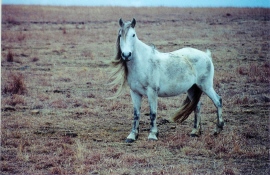|
Preventing or controlling horse parasites
Horse Wormers
Horse wormers are often rotated so there is no chance for resistance to develop. Using maybe an Ivermectin then a Benzimidazole or a Pyrimidine. (Personally I just use Ivermectin 3 times a year) Some use a daily feed additive, which is effective, though you still need to use a botavele (Ivermectin) at least twice a year. According to the OSU extension service, a horse will need to be de-wormed several times a year. You would start this at about 4 to 8 weeks of age. (Use caution and read labels, some wormers are toxic to foals!) Chemical parasite treatments are most effective when used around the time conditions favor hatching of eggs or developing of larvae. Remember, there is no de-worming strategy that fits all horses. Things such as climate, humidity, rainfall, stocking sate of pastures as well as the age of the horse, can determine what strategy you need to use in controlling horse parasites. If you have questions about this it is important to ask your vet or local cooperative extension. Always be sure to isolate and worm any new horses.
Manure management For Controlling Horse Parasites
If the manure in your life isn’t managed, it can cause a BIG stink. (No pun or philosophy intended) Seriously though, this is an area that often isn’t thought about in controlling horse parasites. Manure management or parasite control is one of the easiest ways to help your horse program succeed. No matter how small or large that program is! Interestingly enough, the same things that are effective for controlling horse parasites, also helps your pasture. It’s a win-win situation.
The Big Picture
No matter if a big pasture to you is 10 acres or 1,000 acres, there can still be problems with worm infestations. Horses are very selective grazers, and often develop favorite spots. These spots can get pretty piled up and need attention. We drag our horse pastures as well as cut them for hay. This helps break up the manure (fertilizing as swell) and the hay cutting keeps the grass from getting to tough and unpalatable. We try to burn when we can as this really does a number on manure (Controlled burn on areas of the pasture that can’t be utilized for hay.) Another strategy that can work well with controlling horse parasites, is called alternative grazing. This is where you graze horses in a pasture, then cows, then drag. This can really turn a good pasture an excellent one.
General Tips
For more information on controlling horse parasites, please contact us. Return to Horse Health
|






